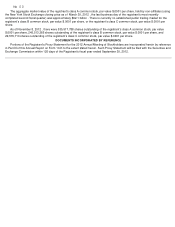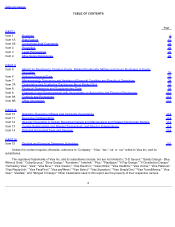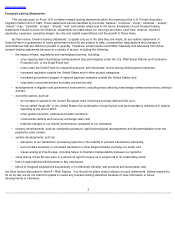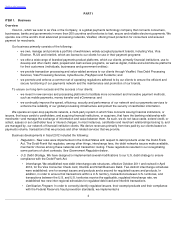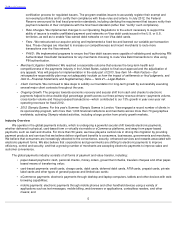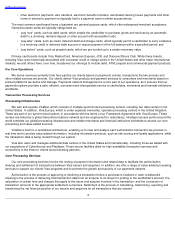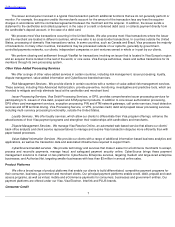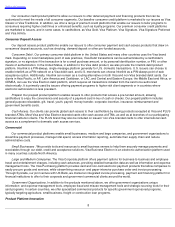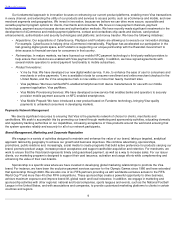Visa 2012 Annual Report Download - page 13
Download and view the complete annual report
Please find page 13 of the 2012 Visa annual report below. You can navigate through the pages in the report by either clicking on the pages listed below, or by using the keyword search tool below to find specific information within the annual report.
Table of Contents
is accounted for as a settlement risk guarantee. The fair value of the settlement risk guarantee is estimated using our proprietary
model, which considers statistically derived loss factors based on historical experience, estimated settlement exposures at period
end and a standardized grading process for clients (using, where available, third-party estimates of the probability of customer
failure). See Item 8—Financial Statements and Supplementary Data — Note 12—Settlement Guarantee Management
elsewhere in
this report.
Payment System Integrity
The integrity of our payments system is affected by fraudulent activity and other illegal uses of our products. Fraud is most
often committed in connection with counterfeit cards or card-not-present transactions using stolen account information resulting
from security breaches of systems not associated with VisaNet that store, process or transmit cardholder or account data, including
systems operated by merchants, financial institutions and other third-party data processors.
Our fraud detection and prevention offerings include:
We work with all participants in the payment system to ensure that any entity that transmits, processes or stores sensitive card
information takes necessary steps to secure that data and protect cardholders. For example, we mandate protection of PIN data
through use of the Triple Data Encryption Standard and work with the payments industry to manage the Payment Card Industry
Data Security Standards (PCI DSS). There has been significant progress in growing industry adoption of PCI DSS, with more than
97% percent of the largest U.S. merchants validating compliance annually.
Government Regulation
General . Government regulation affects key aspects of our business. Our clients are also subject to numerous regulations
applicable to banks and other financial institutions in the United States and elsewhere, and consequently such regulations have the
potential to affect our business indirectly. In recent years, our business has come under increasing regulatory scrutiny. See Item
1A—Risk Factors—
Increased global regulatory focus on the payments industry may result in costly new compliance burdens on our
clients and on us, leading to increased costs and decreased payments volume and revenues .
The Dodd-Frank Act . As noted, during the 2011 fiscal year, the U.S. Federal Reserve established new rules under the Dodd-
Frank Act affecting interchange reimbursement fees, network exclusivity and transaction routing. We expect these rules, which
include provisions effective in our fiscal 2012 and 2013, to continue to have an adverse impact on our pricing, reduce the number
and volume of U.S. debit payments we process and decrease associated revenues. See Item 1A—Risk Factors—The Dodd-Frank
Act may continue to have a material, adverse impact on our financial condition, revenues, results of operations, prospects for future
growth and overall business and Item 7—Management's Discussion and Analysis of Financial Condition and Results of Operations
— Overview. We have significantly modified our debit strategy as a result. See — Overview .
Interchange Reimbursement Fees. We have historically set default interchange reimbursement fees in the United States and
many other geographies. The new rules under the Dodd-Frank Act set the maximum U.S. debit interchange reimbursement fee
assessed for cards issued by large financial institutions at twenty-one cents plus five basis points, before applying a fraud
adjustment of up to an additional one cent. This amounts to a significant reduction from the average system-wide fees charged
previously. See Item 1A—Risk Factors—The Dodd-Frank Act may continue to have a material, adverse impact on our financial
condition, revenues, results of operations, prospects for future growth and overall business ; and Item 1A—Risk Factors—
Additional regulation of interchange
11
•
Verified by Visa, a global Internet authentication product, which permits cardholders to authenticate themselves to their
issuing financial institution using a unique personal code;
•
Visa Advanced Authorization, which provides enhanced fraud detection capability by adding real
-time risk scores to
authorization messages;
• Chip technologies, embedded microprocessors that provide enhanced security and reduce the incidence of counterfeit
card fraud. As a result, Visa has created incentives for merchants and issuers to adopt them, including in the United
States. Chip technologies can also carry other applications that enhance the consumer payment experience; and
• CyberSource's Decision Manager solution, which provides access to over 200 validation tests to assess the legitimacy
of card-not-present orders.


